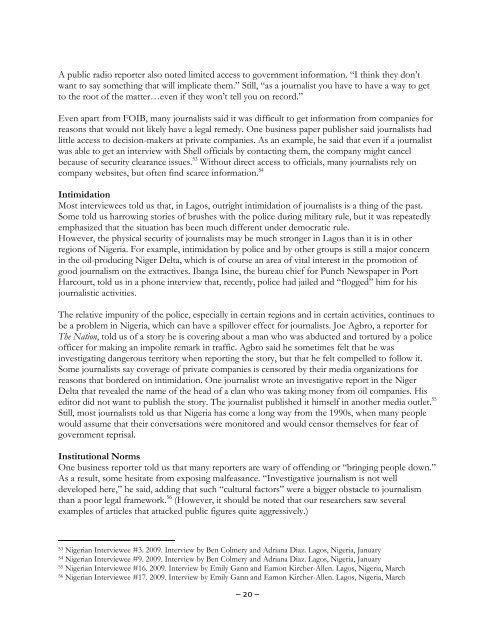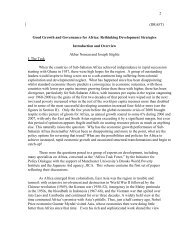A public radio reporter also noted limited access to government in<strong>for</strong>mation. “I think they don’twant to say something that will implicate them.” Still, “as a journalist you have to have a way to getto the root of the matter…even if they won’t tell you on record.”Even apart from FOIB, many journalists said it was difficult to get in<strong>for</strong>mation from companies <strong>for</strong>reasons that would not likely have a legal remedy. One business paper publisher said journalists hadlittle access to decision-makers at private companies. As an example, he said that even if a journalistwas able to get an interview with Shell officials by contacting them, the company might cancelbecause of security clearance issues. 53 Without direct access to officials, many journalists rely oncompany websites, but often find scarce in<strong>for</strong>mation. 54IntimidationMost interviewees told us that, in Lagos, outright intimidation of journalists is a thing of the past.Some told us harrowing stories of brushes with the police during military rule, but it was repeatedlyemphasized that the situation has been much different under democratic rule.However, the physical security of journalists may be much stronger in Lagos than it is in otherregions of Nigeria. For example, intimidation by police and by other groups is still a major concernin the oil-producing Niger Delta, which is of course an area of vital interest in the promotion ofgood journalism on the extractives. Ibanga Isine, the bureau chief <strong>for</strong> Punch Newspaper in PortHarcourt, told us in a phone interview that, recently, police had jailed and “flogged” him <strong>for</strong> hisjournalistic activities.The relative impunity of the police, especially in certain regions and in certain activities, continues tobe a problem in Nigeria, which can have a spillover effect <strong>for</strong> journalists. Joe Agbro, a reporter <strong>for</strong>The Nation, told us of a story he is covering about a man who was abducted and tortured by a policeofficer <strong>for</strong> making an impolite remark in traffic. Agbro said he sometimes felt that he wasinvestigating dangerous territory when reporting the story, but that he felt compelled to follow it.Some journalists say coverage of private companies is censored by their media organizations <strong>for</strong>reasons that bordered on intimidation. One journalist wrote an investigative report in the NigerDelta that revealed the name of the head of a clan who was taking money from oil companies. Hiseditor did not want to publish the story. The journalist published it himself in another media outlet. 55Still, most journalists told us that Nigeria has come a long way from the 1990s, when many peoplewould assume that their conversations were monitored and would censor themselves <strong>for</strong> fear ofgovernment reprisal.Institutional NormsOne business reporter told us that many reporters are wary of offending or “bringing people down.”As a result, some hesitate from exposing malfeasance. “Investigative journalism is not welldeveloped here,” he said, adding that such “cultural factors” were a bigger obstacle to journalismthan a poor legal framework. 56 (However, it should be noted that our researchers saw severalexamples of articles that attacked public figures quite aggressively.)53 Nigerian Interviewee #3. 2009. Interview by Ben Colmery and Adriana Diaz. Lagos, Nigeria, January54 Nigerian Interviewee #9. 2009. Interview by Ben Colmery and Adriana Diaz. Lagos, Nigeria, January55 Nigerian Interviewee #16. 2009. Interview by Emily Gann and Eamon Kircher-Allen. Lagos, Nigeria, March56 Nigerian Interviewee #17. 2009. Interview by Emily Gann and Eamon Kircher-Allen. Lagos, Nigeria, March– 20 –
When asked how much the media could criticize the government, one radio journalist said, “thepeople themselves, they don’t want to indict the government” 57 . There is evidence that such feelingsmay be institutionalized. Anther editor told us he received complaints from the government <strong>for</strong>writing stories considered “unpatriotic” and “disrespectful.” 58TransportationIt is hard to overstate the burden of traffic on daily life in Lagos, where most major papers arebased. Chronic traffic delays make it difficult <strong>for</strong> Lagos-based Nigerian journalists to meet withsources or cover stories. 59 Getting to the scene of a news event, one radio journalist told us, can bevirtually impossible in midday traffic. Journalists often arrive late to assignments, which leads toshallow reporting and increased reliance on residual knowledge and Internet research.Movement to the Business SectorMany journalists who leave the profession do so to work in corporate communications <strong>for</strong> banksand other private companies. Of the journalists our researchers spoke with, many suggested that the2004 bank consolidation, which was implemented by the central bank, drove the need <strong>for</strong> privatesector corporate communications and public relations. The trans<strong>for</strong>mation of Nigeria’s bankingindustry created new banking competition and a greater need to focus on communications as new ornewly merged banks had to re-invent their branding. This is because after a series of hostiletakeovers, mergers and acquisitions, the sector went from 90 banks to roughly 25 in a very shortperiod of time. Business journalists prove to be a natural fit <strong>for</strong> banks, and banks actively recruit thebest business journalists because of their business knowledge, because readers trust them, andbecause other journalists respect them. One journalist said banks take advantage of this trust tomanipulate the media.Training is not a useful way to curtail the flight of business journalists to banking, interviewees said.(The effect, one journalist told us, is like “wanting to make your daughter more beautiful in a waythat no man will admire her.”) Interviewees agreed that the only way to staunch the bleeding to theprivate sector is better pay and benefits such as healthcare, cell phone allowances, transportationallowances, pensions, and holiday bonuses. 60Interviewees told us that the vast majority of journalists who receive business training end upworking <strong>for</strong> the private sector. A radio news editor said that the movement of business journalists tocorporate affairs is almost always economically motivated. He said business journalists can make$800 (60,000 Naira) per month (one of the highest estimates we heard <strong>for</strong> journalist pay) comparedto $3,000 to $4,000 (250,000 to 300,000 Naira) per month as a corporate affairs officer. 61 Corporatejobs sometimes also offer allowances <strong>for</strong> food, clothing, and transportation.One <strong>for</strong>mer business journalist who currently works in corporate affairs <strong>for</strong> a bank said that heended his five-year career as a journalist largely because of the higher pay the bank offered.According to him, journalists’ salaries are one-third to one-fifth of corporate relations sector salaries.The <strong>for</strong>mer journalist said that the average pay at his old paper, Business Day, was $300 per month –57 Nigerian Interviewee #18. 2009. Interview by Emily Gann and Eamon Kircher-Allen. Lagos, Nigeria, March58 Nigerian Interviewee #19. 2009. Interview by Emily Gann and Eamon Kircher-Allen. Lagos, Nigeria, March59 Nigerian Interviewee #9. 2009. Interview by Ben Colmery and Adriana Diaz. Lagos, Nigeria, January60 Nigerian Interviewee #1. 2009. Interview by Ben Colmery and Adriana Diaz. Lagos, Nigeria, January61 Nigerian Interviewee #8. 2009. Interview by Ben Colmery and Adriana Diaz. Lagos, Nigeria, January– 21 –
- Page 1 and 2: THEREWILLBE INKA study of journalis
- Page 3 and 4: AcknowledgementsThis paper has bene
- Page 7 and 8: Executive SummaryPurpose of the Rep
- Page 9 and 10: journalists in these countries that
- Page 11 and 12: Existing International Training Opp
- Page 13 and 14: • Consumer Affairs and Informatio
- Page 15 and 16: Background 3Of the three countries
- Page 17 and 18: pervasive conflict in the Niger Del
- Page 19 and 20: 3) Crises or disruptions, where som
- Page 21 and 22: Low pay and low regardOne of the mo
- Page 23 and 24: Even in cases where working journal
- Page 25: But while some reporters think FOIB
- Page 29 and 30: the effects of these challenges for
- Page 31 and 32: detailed analysis of the opportunit
- Page 33 and 34: journalist said he has, however,
- Page 35 and 36: completely make use of some of the
- Page 37 and 38: money. Their knowledge of what medi
- Page 39 and 40: Notes on conducting research in Nig
- Page 41 and 42: Ghana- 35 -
- Page 43 and 44: evenues each year,” 106 which wou
- Page 45 and 46: entertainment news, scandals, and p
- Page 47 and 48: The rise of business-focused journa
- Page 49 and 50: coverage of the oil industry is als
- Page 51 and 52: needed supplementary income to cash
- Page 53 and 54: as supporting one political party o
- Page 55 and 56: Numerous journalists recounted how
- Page 57 and 58: Training programs available to busi
- Page 59 and 60: Amos Safo, editor-in-chief at the p
- Page 61 and 62: Notes on conducting research in Gha
- Page 63 and 64: Background 136Literacy and Educatio
- Page 65 and 66: “sufficient information” about
- Page 67 and 68: or criminal charges for content the
- Page 69 and 70: have such difficulty obtaining info
- Page 71 and 72: The majority of those interviewed b
- Page 73 and 74: commitment to their profession and
- Page 75 and 76: Notes on Conducting Research in Uga
- Page 77 and 78:
Recommendations for Revenue Watch I
- Page 79 and 80:
people who have no journalism backg
- Page 81 and 82:
analyzes business,” he said, “e
- Page 83 and 84:
A journalist with The Punch said,
- Page 85 and 86:
The Media Foundation for West Afric
- Page 87 and 88:
Length of TrainingRoughly three-qua
- Page 89 and 90:
industries, for instance, ought to
- Page 91 and 92:
otherwise being published in the pr
- Page 93 and 94:
Non-Training Recommendations for Ug
- Page 95 and 96:
Appendix A: NigeriaPotential Partne
- Page 97 and 98:
journalists. Biakolo is very profes
- Page 99 and 100:
Television Stations• Nigerian Tel
- Page 101 and 102:
have two to four month professional
- Page 103 and 104:
City: AccraTelephone: +233 (021) 22
- Page 105 and 106:
Fax: +256 414 255 495E-mail: umdf@a
- Page 107 and 108:
• What do you think are the most
- Page 109 and 110:
Appendix E: Survey Questions1. Name
- Page 111 and 112:
18. How effective were the teaching
- Page 113 and 114:
28. What are the most important cha
- Page 115 and 116:
1. Journalists by Country2. How wou
- Page 117 and 118:
5. How often do you travel out of t
- Page 119 and 120:
9. Which organization(s) sponsored
- Page 121:
12. After completing the training(s














